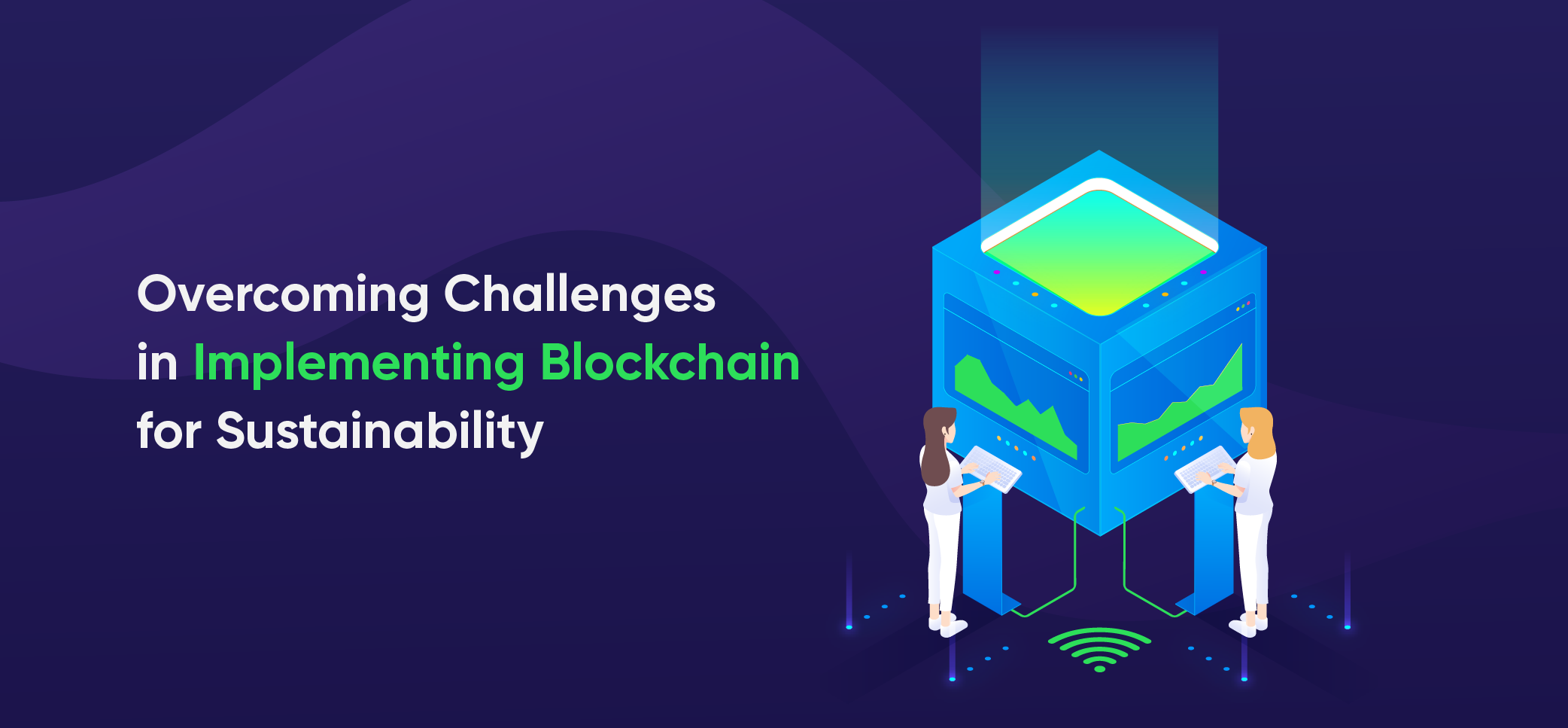
Introduction
Blockchain & Web3 Services Trusted By Leaders
- Develop innovative solutions using our state-of-the-art blockchain expertise.
- Achieve accelerated growth with robust & scalable Web3 consulting.
- Unlock 360-degree security with our top-rated blockchain development.
How Can Blockchain Be Used to Support Sustainable Business Practices in 2023
In recent years, sustainability has recently gained popularity in the business world. Businesses are being pushed harder than ever to implement sustainable practices as the whole community deals with mounting environmental problems and social responsibilities. Blockchain is a particularly effective tool among the many technologies that can aid in achieving these objectives. The use of blockchain to enhance ethical corporate practices will continue to grow in 2023. In this blog, we’ll explore how can blockchain be used to support sustainable business practices in 2023 and positively impact the planet.How Can Blockchain Be Used to Support Sustainable Business Practices?
Supply Chain Transparency
Supply chain transparency improvement is one of the most important sustainability improvements blockchain can provide. The movement of commodities and raw materials from their source to the finished product may be tracked by businesses using blockchain technology. Consumers and stakeholders may independently confirm the veracity of sustainable claims thanks to this transparency. Blockchain can be used by a food company, for instance, to track the origins of its products and ensure that they come from moral and sustainable sources. This lowers the possibility of fraud while also encouraging sustainable behaviors all along the supply chain.Carbon Footprint Reduction
Blockchain can assist businesses in lowering their carbon footprint. Businesses may automate and optimize their operations for efficiency and sustainability using smart contracts and decentralized networks. For instance, energy corporations can use blockchain to build decentralized networks that incorporate renewable energy sources and distribute electricity more effectively. As a result, less carbon dioxide is released into the atmosphere during the creation and use of energy.Renewable Energy Trading
Blockchain has the potential to revolutionize the energy sector by enabling peer-to-peer renewable energy trading. In a blockchain-based energy marketplace, individuals and businesses can buy and sell excess renewable energy directly to one another, eliminating the need for intermediaries. This promotes the use of clean energy sources, incentivizes investment in renewable infrastructure, and reduces dependence on fossil fuels.Carbon Credits and Offset Verification
Blockchain technology can also improve the credibility and transparency of carbon credit markets. Companies that reduce their carbon emissions can tokenize these reductions on a blockchain, creating a verifiable record. This allows for easier tracking and trading of carbon credits, making it more attractive for businesses to invest in carbon reduction initiatives and offset their emissions.Responsible Data Management
Data security and privacy are crucial aspects of sustainability. Blockchain’s decentralized and immutable nature ensures that data remains secure and tamper-proof. This is especially important for businesses handling sensitive environmental data or personal information related to sustainability initiatives. Blockchain can provide a robust foundation for responsible data management practices, enhancing trust and compliance with privacy regulations.Reducing Counterfeits and Fraud
Blockchain technology provides a potent remedy for lowering fraud and counterfeiting in a variety of industries. Because of its intrinsic properties, including immutability and openness, it is very difficult for malicious parties to alter or falsify data. Companies can construct a digital ledger that follows every stage of a product’s journey, from manufacturing to distribution and sale, by recording transactions and product origins on a blockchain. As a result, customers will find it simple to check the legitimacy of products by scanning a QR code or using the blockchain database. This not only prevents customers from buying fake or inferior items but also helps build the reputation of companies that are dedicated to making sure their products are real. Additionally, blockchain’s smart contract capabilities can automate and enforce agreements, reducing the risk of fraudulent activities in sectors like finance, insurance, and real estate, ultimately creating a more secure and trustworthy business environment.Sustainable Finance
Blockchain can play a pivotal role in sustainable finance by promoting ethical investment and responsible financial practices. Through tokenization, investors can have more direct and transparent access to sustainable projects and assets, such as green bonds or impact investments. This empowers individuals and institutions to allocate their capital towards environmentally and socially responsible endeavors.Overcoming Challenges in Implementing Blockchain for Sustainability
 While blockchain holds tremendous promise for supporting sustainable practices, its implementation comes with its own set of challenges. Here are some of the key hurdles that organizations may face when integrating blockchain technology into their sustainability initiatives and strategies:
While blockchain holds tremendous promise for supporting sustainable practices, its implementation comes with its own set of challenges. Here are some of the key hurdles that organizations may face when integrating blockchain technology into their sustainability initiatives and strategies:
1. Complexity and Technical Barriers
Due to the complexity of blockchain technology, not all organizations have the necessary technical know-how to develop and manage blockchain systems. Blockchain network development, deployment, and management can be challenging and require specialized knowledge and materials that may not always be available.
2. Scalability Issues
Many existing blockchain platforms face scalability limitations. As more transactions are added to the network, it can become slower and more resource-intensive. For blockchain to be effective in sustainability efforts, it must be able to handle large-scale operations, such as tracking products across extensive supply chains or managing global carbon credit markets.
3. Interoperability
Blockchain networks often operate in isolation from one another due to differences in protocols and standards. Achieving interoperability between different blockchains is essential for creating a unified and seamless ecosystem, especially when multiple organizations are involved in a sustainability initiative.
4. Energy Consumption
Some blockchain networks, particularly those that use Proof of Work (PoW) consensus algorithms, consume substantial amounts of energy. This can contradict the goal of sustainability if the energy consumption is not sourced from renewable and eco-friendly resources.
5. Regulatory and Legal Compliance
The legal and regulatory landscape surrounding blockchain is still evolving. Navigating the compliance requirements and addressing legal issues, such as data privacy and intellectual property rights, can be challenging and time-consuming.
6. Costs and Investment:
Implementing blockchain technology often requires a significant initial investment in infrastructure, development, and ongoing maintenance. Smaller businesses and startups may find it challenging to allocate resources to such endeavors.
Industries Gaining the Most from Blockchain Adoption
Blockchain technology has been making waves across various industries, revolutionizing the way businesses operate. While its potential applications are vast, some industries are reaping the most benefits from blockchain adoption. Financial services, for instance, have embraced blockchain to enhance security, reduce fraud, and streamline transactions.- Supply Chain Management: The supply chain industry has been transformed by blockchain technology. By creating immutable and transparent records of every transaction and movement of goods, blockchain reduces fraud, counterfeiting, and errors in the supply chain. These benefit industries ranging from agriculture to retail, as consumers can trace the origins of products and ensure their authenticity.
- Healthcare: Healthcare is undergoing a major overhaul with the adoption of blockchain technology. Patient data security and interoperability between different healthcare providers have long been challenges in the industry. Blockchain offers a solution by enabling the secure and interoperable exchange of patient records while ensuring data privacy.
- Financial Sector: Blockchain technology has disrupted the financial sector by offering increased security, transparency, and efficiency. Cryptocurrencies like Bitcoin have gained widespread recognition as digital assets, and blockchain underpins their transactions. Banks and financial institutions are leveraging blockchain to streamline cross-border payments, reduce fraud, and enhance the speed of transactions.